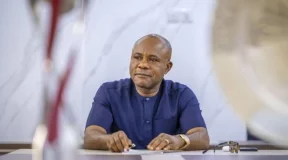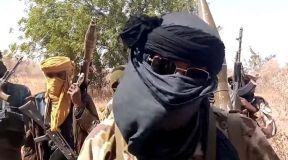Laying the seed for another calamity sooner than expected is the rational and empirical deductions from the moves by legislators to enact laws empowering paramilitary organizations to bear arms
OpenLife reports that there is a sinister motive in the move by National Assembly to enact laws empowering paramilitary organizations to bear arms.
One can always see bad judgment and lack of foresight in the legislative prerogative of Nigerian legislators. There are complaints in the country over the attempts by the National Assembly to supports paramilitary organization carrying arms with enabling laws.
Paramilitary under consideration includes the Federal Road Safety Commission, FRSC, Vehicle Inspection Officers, VIO and others.
Unarguably, the police the Nigeria Police Force is the primary law enforcement agency responsible for maintaining law and order in the country.
However, the purchase of 40,000 AK-47 assault rifles, 30,000 K2 assault rifles, and 10,000 pistols has raised concerns among Nigerians who think the police need to be better trained, not better armed, and that assault rifles are not the best option for a police force struggling to reform its reputation for brutality.
The Nigeria Police Force is currently structured into zones, with between 2 and 4 state commands within each zone, and then a series of area commands, divisions, police stations, and police posts under these commands.
A commissioner of police leads each state command, and there is a hierarchical chain of command down to the lowest level, the police post. In addition to the state command, each state possesses at least 2 area commands, 10 divisions, and 1 1 police stations, with some states possessing far greater numbers.
Half of this number serves as a guard to politicians across tiers of government. Those who are protecting public office holders are protecting corporate czars with an insignificant number left to perform statutory police functions.
This speaks volumes about the ruling elite’s proclivities to making rules aimed at protecting their selfish interest.
The idea to extend arm use to this para military agency of the government is primarily to “make the road safe” for the elites, not necessarily to tackle sophisticated crime. Even at that, roads across Nigeria are in bad states and needed to fix.
Secondly, Nigeria’s law needs to be improved. Reformed! In Lagos for instance there is the lingering overlap and duplication of duties between competing agencies (Federal VS State) as to who has the right to issue license in Lagos State for instance.
Failing to do these reforms, and going ahead to arm the traffic and road agencies, is merely putting Nigerians at risk. There is sure to be confrontations between operatives of the agencies and road users.
Road users in Lagos can readily attest to the harassment with overzealous and corrupt Vehicle Inspection Officers, VIO, operatives on Lagos roads. Federal Road Safety Corps, FRSC, operators, on out-of-town highways are laws unto themselves, (try Badagry-Seme Road). Arming them without reforms is granting them a license to kill Nigerians. Sooner or later, an endears-like protest will erupt.
Lastly, having all forms of agencies left and right gaining access to arms and its uses is not healthy for the country. We should restrict the number of the populace with gun access, skills and opportunities to core military officials – Army, Navy, Airforce and the Police. With Customs, Immigrations, NDLEA, NSDCA, EFCC, SSS all gun-bearing agencies, it is needless to start proliferating gun uses and access.
In classification, the Nigerian Army carries all calibers of arms including the Nigerian Air Force, Nigerian Navy and State Security Services.
Currently, the National Drug Law Enforcement Agency’s members of operational departments bear small arms while on duty.
This is the crux of the matter that needs government review of its intention to avoid laying the seed of discord and anarchy in the years ahead.







